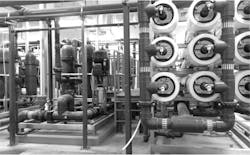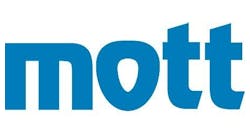Applications of Reverse Osmosis in the Food Industry
Ever eaten an Oreo?
Chances are it was manufactured with our water.
In 2017, Advanced Watertek landed a tasty job. A sweet gig! Our team was contracted to design and manufacture a large scale commercial reverse osmosis system for one of the world's largest snacks companies. The multinational corporation had just broken ground on a massive undertaking — a $90 million food manufacturing plant, specifically for biscuits.
Located in the Middle East, the facility was being purpose-built from scratch, and was filled with state-of-the-art technology and automation.
Completed in 2018, the massive food processing facility stretches over 250,000m2. At peak operation, the factory produces 60,000 tons per year of food goods with 10,000 biscuits every minute.
The food company had two non-negotiable outcomes that they needed to achieve with their water supply. If you're currently working within the food production industry, they will both sound familiar to you.
The first was to create a reliable source of water. Regardless of operating conditions, an 'always-on' facility like theirs requires a constant supply of high purity water. They operate in a very competitive market, and any hit to production capabilities would leave them unable to fulfill previously agreed upon targets.
Secondly, the quality of the product water had to be 100% as specified, with no deviation over time, and unaffected by external factors. Water used as ingredient water in the food industry must comply with all local standards, plus any government regulations and export market requirements.
Businesses in the food industry know the importance of water purity on food safety and risk control. For a global company, with facilities across the world producing the same product ranges, there's another benefit to claim from a consistent water supply. Homogenization is key — the famous biscuit taste must be replicated across the world in all production sites. Whether the customer is snacking on a biscuit made in Europe, Indonesia or Bahrain, any biscuit should taste the same.
The completed water treatment system uses a dual-train, skid mounted design. Designing commercial reverse osmosis equipment in a dual train configuration gives clients greater flexibility in arrangements. The system was assembled, customized and tested at the site.
High quality stainless steel is a hygienic choice for the skid, or skeleton. There's no place for bacteria to hide in the joints. Systems located alongside food processing equipment must stand up to industrial washdown and regular sanitation procedures. By using cleaning-in-place protocols (CIP) the reverse osmosis membranes can be effectively cleaned with minimal disruption, using standard chemicals.
The water treatment system processes chlorinated feed water from a municipal source. Incoming water quality had roughly 400 ppm of total dissolved solids, known as TDS. The two separate trains of the system use high quality brackish water reverse osmosis membranes, in conjunction with sediment prefiltration, to bring the product water down to just under 40 ppm — suitable for all process applications. Chlorates, phthalates and bromates are also eliminated.
Reverse osmosis, in essence, brings the salinity of water down to zero ppm, or as near to zero as operators require for their process. Water used as an ingredient in food and beverages must be free of any unwanted impurities, including undesirable tastes, odors and colors. We achieve this by building multiple layers of filtration into a water treatment system. Multimedia filtration tanks, filled with sand, gravel and anthracite layers, are the first step. Then, cartridge filtration takes the feed water through five, then one micron filtration. Finally, the water is passed to the reverse osmosis membranes, which prepares it for use in food production.
Membrane separation technology can remove a variety of dissolved solids, including salts, from water. Within the food industry, associated membrane separation technologies including nanofiltration and ultrafiltration are commonly used in milk and juice production, alcohol removal from spirits, or egg white concentration, to name a few applications.
The possible applications of reverse osmosis within the food industry are numerous — and growing. Reverse osmosis is become more common every year within food processing facilities. The beverage industry uses RO in the production of beer, wine and spirits, as well as soft drinks and juices. Infant milk production demands high purity ingredient water. Dairies and meat processing facilities, as industries adjacent to food production, also have many requirements for high purity water, including hygiene & food security considerations, plus regular washdown.
A food industry operator begins a cleaning and sanitation procedure.
The food company utilize their reverse osmosis water for three different purposes:
- Food production
- Food production equipment
- Cooling towers
Food companies can find many benefits through investing in a reliable water supply. Consider the financial benefits that reducing your water footprint can provide. Efficient systems require little maintenance, lowering operational expenditure. Reverse osmosis can purify water without using large quantities of harsh chemicals, so your environmental footprint can also be reduced. The addition of a UV disinfection system can eradicate bacteria, viruses, algae and fungi. Removing these biological contaminants from your water will help your production environment stay clean and risk-free.
Reverse osmosis is a versatile technology. It allows operators in the food industry to generate high purity water from alternative water sources that traditionally may not have been considered economically viable. What could reverse osmosis help your business achieve?
About the Author: Rekha Philip is a marketing manager for Advanced Watertek, an OEM & industry leader in membrane-based technologies for water treatment since 1984 with offices in UAE, Australia, and Oman. For more information about the company, go to https://www.advancedwatertek.com.


